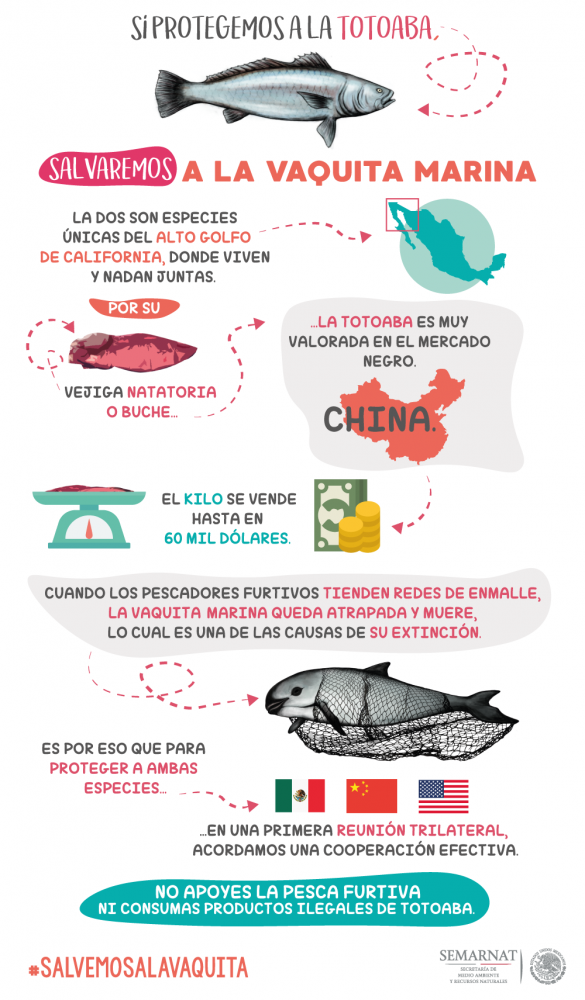Illegal fishing of this species is one of the causes of the extinction of the vaquita, which, like totoaba, is endemic to the Upper Gulf of California, and is incidentally caught in the gillnets used in that activity….
A trilateral meeting between Mexico, the People’s Republic of China and the United States of America was held in Ensenada, Baja California, in a collaborative effort to combat international fish trade with the assistance of senior officials from the three governments.
“In the government of President Enrique Peña Nieto an effort has been made as in no other administration in the history of Mexico to protect the vaquita,” said Rafael Pacchiano Alamán, Environment and Natural Resources Secretary.
He emphasized the actions that the different Government departments have carried out in a coordinated way to avoid the fishing of the vaquita. Among others: the development of new fishing gear that can interact safely with this porpoise, and adaptations to the laws to be able to classify as a serious crime and relate to organized crime fishing of totoaba. He informed that this legal framework already allowed the first consignments of people involved in the illegal capture of this species.

Information about the illegal fishing of totoaba and the vaquita issue (Image: La Revista Peninsular, SEMARNAT)
Accompanied by the governor of Baja California, Francisco Arturo Vega de Lamadrid, and by Ambassador Miguel Ruiz Cabañas, undersecretary for Multilateral Affairs and Human Rights of the Foreign Relations Secretariat, Secretary Pacchiano made a special recognition to the communities of San Felipe and Santa Clara for its unconditional support to the efforts of the Mexican government.
He also thanked the Mexican Navy for strengthening surveillance in the protected area where the vaquita lives: “We have more than 300 marine personnel in the area, more than 15 vessels, unmanned aircraft systems and a significant deployment of the Mexican Army and recently the Environmental Gendarmerie,” said the federal official.
Recognizing the willingness of the governments of China and the United States in combating illegal fishing and trafficking of totoaba, he called for the strengthening of collaborative actions and exploring options for the design of a legal trade of totoaba for the purpose of not only to protect biodiversity in the Upper Gulf of California, but also to provide local people with sustainable living alternatives.
Meanwhile, the Federal Prosecutor’s Office for Environmental Protection (PROFEPA), whose participation was fundamental in the realization of this trinational forum for officials responsible for the detection, investigation, prosecution and punishment of illegal trafficking of totoaba, proposed the creation of a Group of operative force that is in charge of promoting these tasks.
The meeting was attended by representatives of the Agriculture, Livestock, Rural Development, Fisheries and Food Secretariat (SAGARPA), the National Fisheries Commission (CONAPESCA), the Foreign Affairs Secretariat (SRE) and the environmental sector. Federal Office of Environmental Protection (PROFEPA) and the National Area Commission (CONANP), Guillermo Haro Bélchez and Alejandro del Mazo Maza, respectively.
In addition, José Luis Funes, representative of the administrative authority of the Convention on International Trade in Endangered Species of Wild Fauna and Flora (CITES) in Mexico , Officials of the Attorney General’s Office (PGR), Interpol Mexico and a mission of the United Nations Educational, Scientific and Cultural Organization (UNESCO).
The Chinese delegation was led by Mr. Meng Xianlin, Executive director of the Office of Importance Management of Endangered Species, and 11 US officials led by Tijuana’s General Consul William Ostick.
Source: www.larevista.com.mx


